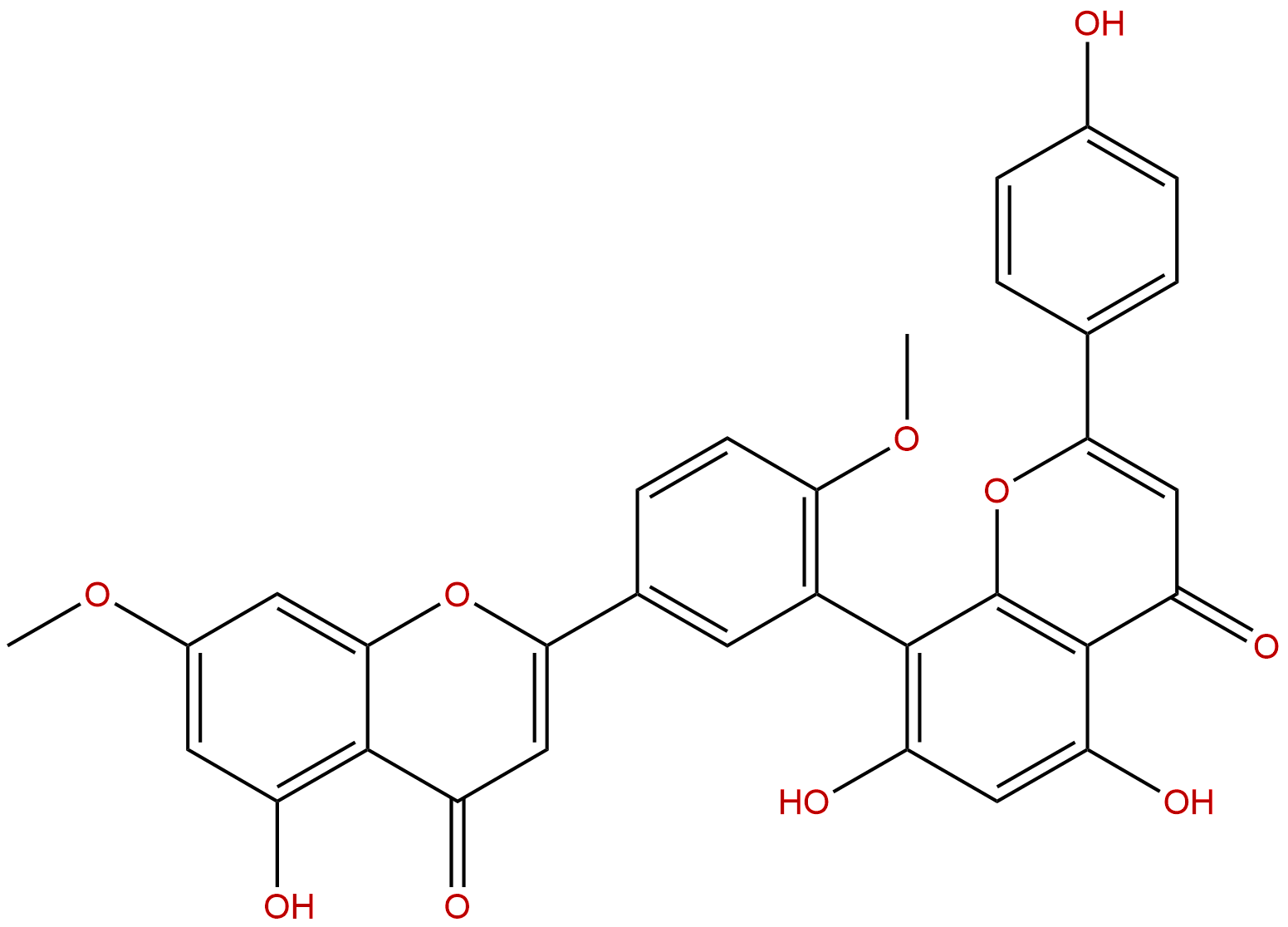
GinkgetinCAS No.:481-46-9 |
||||||||||
 |
|
|
||||||||

| Catalogue No.: | BP0642 |
| Formula: | C32H22O10 |
| Mol Weight: | 566.518 |
| Botanical Source: | Ginkgo biloba L. |
Product name: Ginkgetin
Synonym name:
Catalogue No.: BP0642
Cas No.: 481-46-9
Formula: C32H22O10
Mol Weight: 566.518
Botanical Source: Ginkgo biloba L.
Physical Description:
Type of Compound: Flavonoids
Purity: 95%~99%
Analysis Method: HPLC-DAD or/and HPLC-ELSD
Identification Method: Mass, NMR
Packing: Brown vial or HDPE plastic bottle
Storage: Store in a well closed container, protected from air and light. Put into refrigerate or freeze for long term storage.
The product could be supplied from milligrams to grams
Inquire for bulk scale.
Description:
Ginkgetin is a good STAT3 inhibitor , which has anti-inflammatory, neuroprotective, anti-influenza virus and anti-fungal activities. Ginkgetin induces apoptosis in PC-3 cells via activation of caspase 3 and inhibition of survival genes as a potent chemotherapeutic agent for prostate cancer treatment.
References:
Bioorg Med Chem Lett. 2013 May 1;23(9):2692-5.
Ginkgetin induces apoptosis via activation of caspase and inhibition of survival genes in PC-3 prostate cancer cells.
Ginkgetin is a natural biflavonoid isolated from leaves of Ginkgo biloba L. Though it was known to have anti-inflammatory, anti-influenza virus, anti-fungal activity, osteoblast differentiation stimulating activity and neuro-protective effects, the underlying antitumor mechanism of Ginkgetin still remains unclear. Thus, in the present study, anti-cancer mechanism of Ginkgetin was elucidated in human prostate cancer PC-3 cells.
METHODS AND RESULTS:
Ginkgetin suppressed the viability of PC-3 cells in a concentration-dependent manner and also significantly increased the sub-G1 DNA contents of cell cycle in PC-3 cells. Ginkgetin activated caspase-3 and attenuated the expression of survival genes such as Bcl-2, Bcl-xL, survivin and Cyclin D1 at protein and mRNA levels. Consistently, pan-caspase inhibitor Z-DEVD-fmk blocked sub G1 accumulation and cleavages of PRAP and caspase 3 induced by Ginkgetin in PC-3 cells.
CONCLUSIONS:
Overall, these findings suggest that Ginkgetin induces apoptosis in PC-3 cells via activation of caspase 3 and inhibition of survival genes as a potent chemotherapeutic agent for prostate cancer treatment.
Free Radic Res. 2015 May 12:1-39.
Neuroprotective effects of ginkgetin against neuro-injury in Parkinson's disease model induced by MPTP via chelating iron.
Disruption of neuronal iron homeostasis and oxidative stress are closely related to the pathogenesis of Parkinson's disease (PD). Ginkgetin, a natural biflavonoid isolated from leaves of Ginkgo biloba L, has many known effects, including anti-inflammatory, anti-influenza virus, and anti-fungal activities, but its underlying mechanism of the neuroprotective effects in PD remains unclear.
METHODS AND RESULTS:
The present study utilized PD models induced by 1-methyl-4-phenylpyridinium (MPP(+)) and 1-methyl-4-phenyl-1, 2, 3, 6-tetrahydropyridine (MPTP) to explore the neuroprotective ability of Ginkgetin in vivo and in vitro. Our results showed that Ginkgetin could provide significant protection from MPP(+)-induced cell damage in vitro by decreasing the levels of intracellular reactive oxygen species and maintaining mitochondrial membrane potential. Meanwhile, Ginkgetin dramatically inhibited cell apoptosis induced by MPP+ through the caspase-3 and Bcl2/Bax pathway. Moreover, Ginkgetin significantly improved sensorimotor coordination in a mouse PD model induced by MPTP by dramatically inhibiting the decrease of tyrosine hydroxylase expression in the substantia nigra and superoxide dismutase activity in the striatum. Interestingly, Ginkgetin could strongly chelate ferrous ion and thereby inhibit the increase of the intracellular labile iron pool through downregulating L-ferritin and upregulating transferrin receptor 1.
CONCLUSIONS:
These results indicate that the neuroprotective mechanism of Ginkgetin against neurological injury induced by MPTP occurs via regulating iron homeostasis. Therefore, Ginkgetin may provide neuroprotective therapy for PD and iron metabolism disorder related diseases.